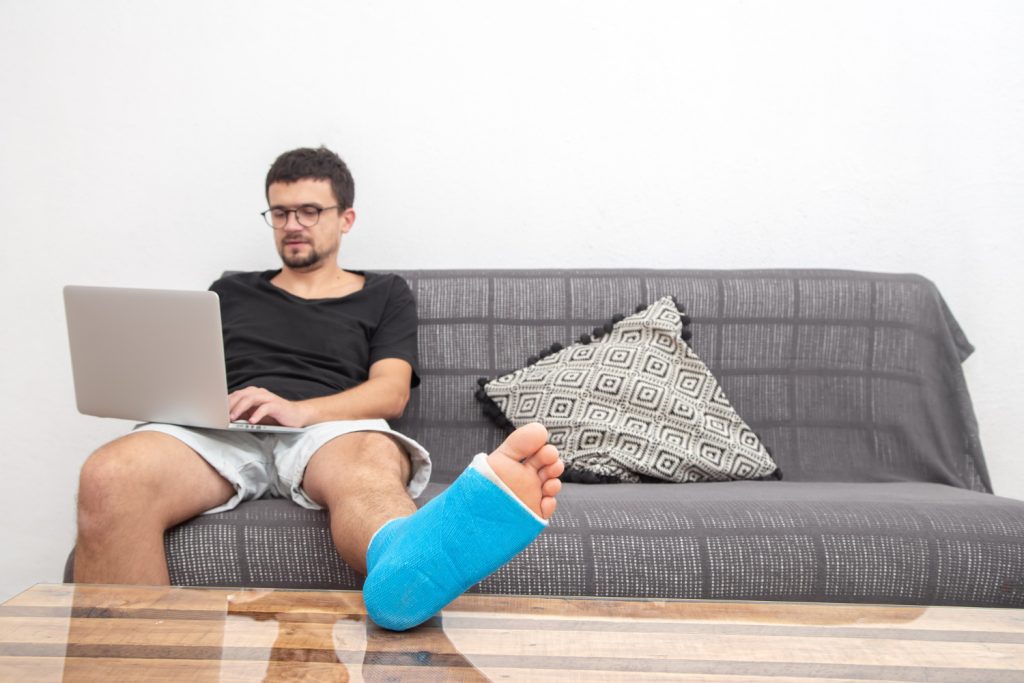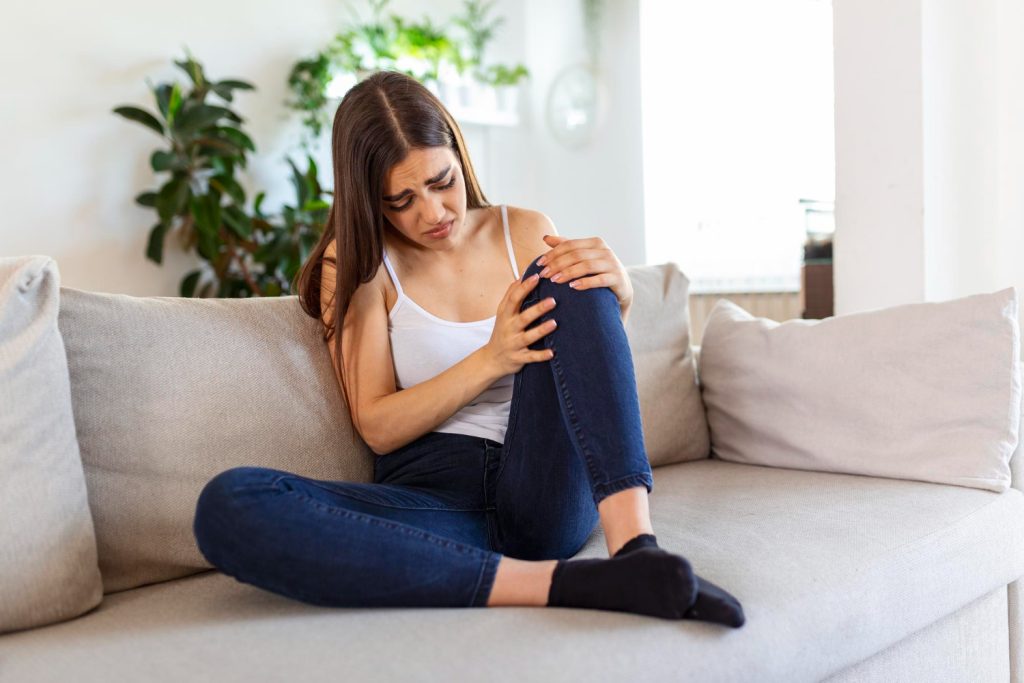You’re not the only one who has had awful leg pain that kept them from sleeping. Numerous people of various ages experience this common problem. Once you know what’s causing it, you can get a good night’s sleep again. Leg pain when lying down but not standing can be very different, ranging from cramps and twitches to tingling and constant aching. It doesn’t matter how often this happens to you, you need to find out what’s causing or adding to the pain and talk to a professional to find a long lasting solution.
Typical Signs of Leg Pain
Some leg pain is different from others. Leg pain can feel like a lot of different things, so keep an eye out for them all. Some of them are:
- Having tingling feelings
- Sensations of tightening
- Sensations of burning
- Feeling like your legs are heavy
- Itching
- Illness in muscles
If you only have leg pain at night or when you’re sitting down but not when you’re standing, this could be a sign of a problem with your blood flow. Read on to find out more about some possible reasons.

What Hurts My Legs When I Lie Down?
Most of the time, leg pain when lying down but not standing is caused by minor issues that may not need immediate medical attention. These causes are generally not dangerous, and you can control your symptoms with easy changes to your lifestyle or over-the-counter medicines. Here are some examples of low-concern causes:
- Overuse or Strain of Muscles: Muscles can become overworked and strained after a day of heavy physical activity or when starting a new exercise routine. This can make it painful and uncomfortable at night when the body is trying to rest.
- Poor Posture: If you sit or stand for a long time with bad posture, your muscles can get tired and hurt. Changing your stance and getting up and moving around often can help ease this pain.
- Small Injuries: The body’s natural inflammatory reaction to healing can make small cuts, bruises, or sprains hurt in one place when you lie down.
- Dehydration or Electrolyte Imbalance: Muscle cramps and pain are often worse when you’re laying down or relaxing because you aren’t drinking enough water or your electrolytes (potassium, magnesium, and calcium) aren’t balanced.
- Circulation Problems: If you sit or lie still for too long, your blood flow may get slowed down temporarily. This can make your legs feel pins and needles or hurt. Changing positions a lot can help with this problem.
It is very important to pay attention to your body and notice how it reacts to exercise and rest. Most of these less serious causes of leg pain are easy to deal with. For example, you can stay hydrated, eat a balanced diet full of minerals, keep good posture, and do some light exercise every day to strengthen your muscles and improve your circulation. However, if leg pain lasts for a long time or comes with other worrying signs, you should see a doctor to rule out more serious conditions.
Vein-Related Leg Pain When Lying Down
Vascular Problems
Varicose veins happen when your veins get swollen, expanded, and overfilled with blood. They often look bluish-purple or red and are uncomfortable or painful to touch. This problem isn’t just an issue of looks; it can also be painful and lead to more serious health issues.
Vases in your legs work against gravity to bring blood back to the heart during the day. Because you’re not pulling on gravity when you lie down, your blood flow may change quickly. This can cause pressure to build up in the veins that have varicose veins. This extra pressure can make you hurt and ache. Varicose veins are often caused by vein valves that don’t work properly, which stops blood from moving back to the heart as it should. When you lie down, it’s easier for blood to pool in these veins, which raises the pressure and causes pain and discomfort. Varicose veins can cause, but aren’t limited to, the following symptoms:
- Increased Visible Vein Size
- It hurts and itches
- Being burned or throbbing
- Problems with Muscles
- Scratching
- Changing Skin
These signs usually mean that the veins aren’t working right, which makes it hard for blood to flow back to the heart. Some people only care about their looks when they have varicose veins, but if you don’t treat them, they can cause more serious health problems. Talking to a doctor or nurse is suggested if your symptoms don’t go away or get worse.
Peripheral Artery Disease
Peripheral artery disease (PAD), a condition in which the peripheral arteries, mostly in the legs, get thin, is a common cause of leg pain at night. Atherosclerosis, in which fatty deposits build up on the sides of the arteries and block blood flow, is the main cause of peripheral artery disease. The symptoms of this disease usually get worse at night and can have a big effect on the health of your legs. The following are signs of peripheral artery disease:
- Claudication, pain, or leg cramps when walking or going up or down stairs.
- Feeling cold on your feet.
- Spots on the skin.
- Getting wounds on your legs and feet that don’t heal quickly.
As PAD gets worse, to a stage called critical limb ischemia, the pain can become consistent, even when the person is lying down. This means that they need to see pain management in Dallas right away to restore blood flow and stop tissue damage or loss.
Restless Leg Syndrome
Willis-Ekbom disease, also known as restless leg syndrome, is a neurological problem that makes you want to move your legs all the time, even if it hurts or makes you uncomfortable. The following are signs of restless leg syndrome:
- Itching, tingling, or burning feelings that make you want to move your legs
- Getting worse symptoms at rest or at night Sleep problems and trouble going asleep
- Help for a short time when you move your legs
People think that restless leg syndrome is caused by a mix of genetic and environmental factors, such as triggers like
- Not enough iron
- A few medications
- Getting sick during pregnancy
- Nerve damage in the legs
Restless leg syndrome can be treated in different ways, depending on how bad the disease is. The majority of options involve making changes to your lifestyle and getting treatments that can help ease your pain and sleep problems, which you can talk about with your doctor.

Home Remedies For Leg Pain
Home treatments for leg pain might not get rid of the cause, but they can help with mild and short-term pain. If you’re having leg pain, try these home remedies:
- Time to rest and rise
- Bring in heat or ice packs
- Getting massaged
- Stretching
- Magnesium supplements
- Over-the-counter medications for the skin
- Essential oils
For more insights and resources, visit our homepage at Diansco Health.
Last Words
You should see a leg specialist in Dallas if leg pain keeps waking you up at night or makes it hard for you to fall asleep. In addition to sciatica, bad posture and muscle cramps can also cause leg pain when lying down but not standing. If you get a correct diagnosis, you can get the right medicine and feel better faster.


